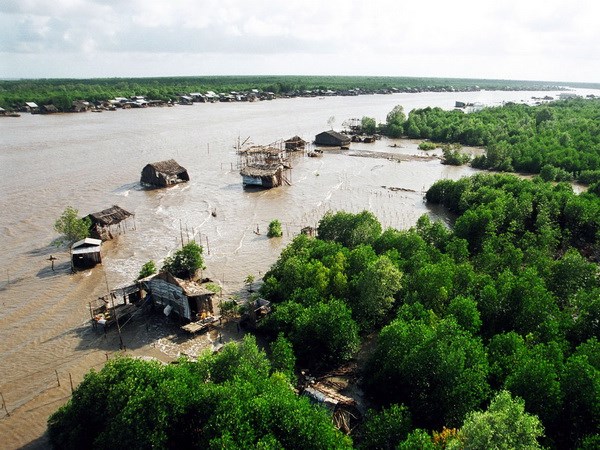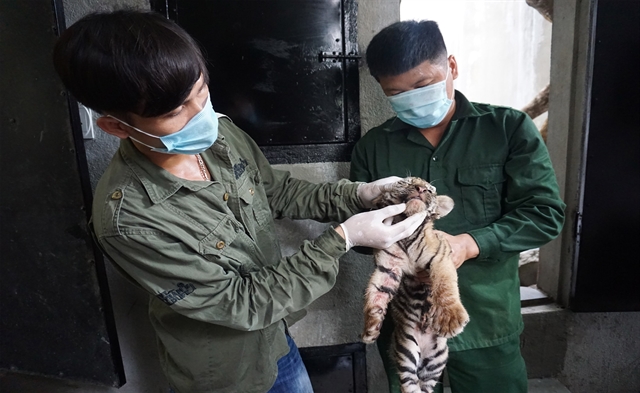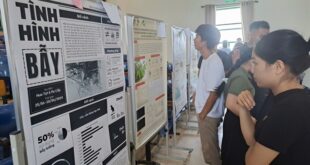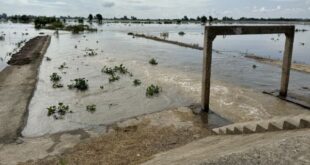
|
| An aerial view of Cà Mau Mangrove Forest in the southernmost province of Cà Mau. — VNA/VNS Photo |
HÀ NỘI — Ecosystem services play a crucial role in attracting resources for biodiversity conservation and fostering sustainable livelihoods for communities engaged in ecosystem conservation and natural environment protection. Nevertheless, effective strategies are required to both utilise and conserve ecosystem services concurrently.
Dr Nguyễn Thế Chinh, former director of the Institute of Strategy and Policy on Natural Resources and Environment under the Ministry of Natural Resources and Environment, stated that ecosystem services have contributed to socio-economic development in Việt Nam. Different economic sectors employed various types of ecosystem services based on their input requirements. Four main categories of ecosystem services included provisioning services, regulating services, cultural services, and supporting services.
These services were at risk of decline without effective exploitation strategies that balanced conservation and development, he said. Hence, the establishment of suitable policies and legislation was essential to address the relationship between ecosystem services and socio-economic development.
The goal is to evaluate the impact of ecosystem services on socio-economic development, quantify the value of these services, and use them as a basis for crafting appropriate policies, particularly economic policies for conserving, utilising and exploiting ecosystem services.
Hoàng Thị Thanh Nhàn, deputy director of the ministry’s Department of Nature Conservation and Biodiversity, pointed out the fundamental role of biodiversity and ecosystem services in the nation’s development.
Việt Nam consistently demonstrated its commitment to international community efforts aimed at achieving global objectives for biodiversity conservation. The National Biodiversity Strategy to 2030, with a vision to 2050, set goals including expanding the network of natural conservation areas and restoring ecosystems, harnessing the value of ecosystem services and biodiversity, she said.
According to Article 138, Section 1 of the 2020 Environmental Protection Law, payment for natural ecosystem services refers to organisations or individuals paying providers for the environmental and landscape values created by natural ecosystems to protect, maintain, and develop these natural ecosystems.
The law clearly defines the payment mechanisms for natural ecosystem services. Organisations and individuals using natural ecosystem services directly pay providers through a mutually agreed contract. In cases where direct payment is not feasible, organisations and individuals utilising natural ecosystem services pay providers through an intermediary.
Dr Lại Văn Mạnh from the Institute of Strategy and Policy on Natural Resources and Environment highlighted the importance of ecosystems for human well-being.
The institute’s recent research on the valuation of ecosystem services in Cà Mau Mangrove Forest in southern Cà Mau Province and Pù Mát National Park in central Nghệ An Province underscores the pivotal role of ecosystems in contributing to human welfare through direct use values, indirect use values, and conservation values.
In Cà Mau Province, the research focused on quantifying the value of the coastal mangrove forests, while in Nghệ An Province it assessed the value of biodiversity and natural landscapes in Pù Mát National Park. These valuations served as the foundation for sustainable management of natural resources, contributing to local economic and social development, he said.
The total economic value generated by Cà Mau’s mangrove forest reached VNĐ1.74 trillion (US$70.7 million) per year, while Pù Mát National Park’s value stood at VNĐ12.81 trillion ($520.7 million) per year (excluding conservation values).
It was essential to establish financial mechanisms and policies to attract resources for biodiversity conservation through natural ecosystem service payments, he added.

|
| A baby tiger is handed over to officers at Pù Mát National Park in central Nghệ An Province. — VNA/VNS Photo |
The institute and the United Nations Development Programme (UNDP) have formulated a project for natural ecosystem service payments at the provincial and grassroots levels, and are preparing a pilot project for carbon sequestration and storage in marine and wetland ecosystems, he said.
To actively manage ecosystems and sustainably use their services, Dr Chinh suggested several solutions, including refining the policy and legal framework, modifying governance structures, incorporating biodiversity and nature’s contributions to humans into sectoral policies, plans, programmes and strategies, and adjusting the use of goods and ecosystem service-related activities.
Building and applying sustainable livelihood models for communities in agricultural, forestry, and aquaculture areas, especially buffer zones of natural conservation areas, was also crucial, he said. — VNS
- Reduce Hair Loss with PURA D’OR Gold Label Shampoo
- Castor Oil Has Made a “Huge” Difference With Hair and Brow Growth
- Excessive hair loss in men: Signs of illness that cannot be subjective
- Dịch Vụ SEO Website ở Los Angeles, CA: đưa trang web doanh nghiệp bạn lên top Google
- Nails Salon Sierra Madre
 VnExpress News The News Gateway of Vietnam
VnExpress News The News Gateway of Vietnam





